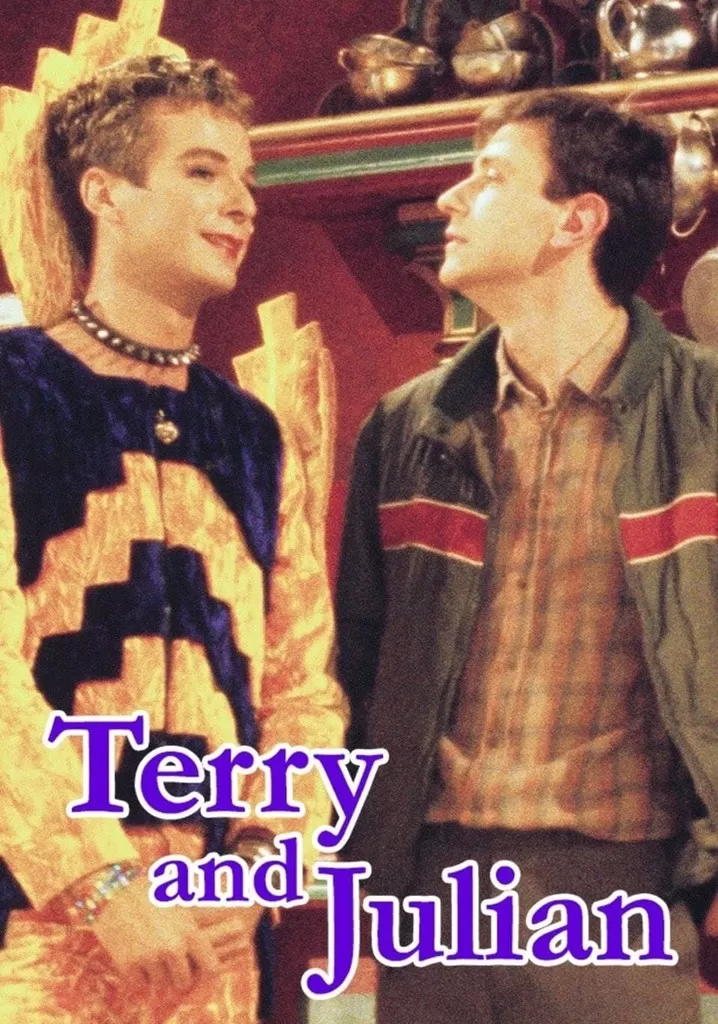Terry and Julian (UK Sitcom) – A Whimsical Dive into Camp Comedy
If you ever find yourself yearning for a sitcom that dances on the edge of convention, “Terry and Julian” is a wild ride you won’t soon forget. This British comedy, which aired on Channel 4 back in 1992, only lasted a single season—just six episodes, each a brisk twenty-something minutes. But what it lacks in length, it more than makes up for in sheer audacity and charm.
From the get-go, “Terry and Julian” throws out the rulebook. The show doesn’t just break the fourth wall—it practically bulldozes it, inviting the studio audience right into the heart of the action. I still remember the moment when an unsuspecting audience member was whisked onto the set, handed a bouquet, and sent back grinning. It’s as if the show itself reached out and gave the viewers a cheeky wink, saying, “Hey, you’re part of this madness too!”
The premise is deliciously absurd: Julian, a flamboyant TV personality with a wardrobe that could make Elton John blush, moves in with Terry, the ultimate everyman—awkward, earnest, and just a bit geeky. The contrast between the two is pure comedic gold. Julian doesn’t just redecorate Terry’s drab flat; he transforms it into a pink, frilly fever dream straight out of a Barbara Cartland novel. Poor Terry’s life is turned upside down, and his pint-sized, moustachioed policewoman fiancée Rene is none too pleased. Honestly, I found myself rooting for Terry, even as Julian’s antics had me snorting with laughter.

The dialogue is a playground of double entendres and razor-sharp wit. Episode one sets the tone: Julian swoops in, redecorates, and throws Terry’s world into chaos. By episode two, Terry’s wedding plans are in shambles until Julian saves the day with a tub of creosote—don’t ask, just watch. The episodes tumble forward with money-making schemes, job mishaps, and, finally, a holiday adventure featuring matching shorts and a whole lot of swanning about. I couldn’t help but chuckle at the sheer silliness.
Now, I’ll be honest—those first two episodes had me hooked. The energy was infectious, and Julian’s over-the-top persona lit up the screen. But as the series settled into its groove, a certain repetitiveness crept in. The jokes started to feel a bit dated, and the novelty wore thin. Still, Terry’s actor delivered a performance that was both endearing and quietly hilarious. I suspect Julian stole the spotlight back in the day, but Terry’s understated charm shouldn’t be overlooked.
One thing that really struck me was the show’s approach to gay humor. For early ‘90s television, the jokes—while frequent—felt surprisingly progressive. I grew up watching British comedies, and Channel 4 always seemed to be a step ahead, pushing boundaries in ways that made you think as much as laugh. Rene, Terry’s fiancée, was a comic gem herself, always talking a big game but dodging any real intimacy. Her sudden disappearance after episode three left me wondering what might have been.
Why wasn’t “Terry and Julian” renewed? Who knows. Maybe its brand of camp was just a bit too much for mainstream tastes at the time. But for me, watching these six episodes was like opening a time capsule—reminding me of a younger, more innocent era when TV dared to be a little bit outrageous. And let’s not forget Julian’s wardrobe! Those costumes were a spectacle all their own, flamboyant and fabulous, and honestly, not everyone could pull them off.
In the end, “Terry and Julian” is a quirky, glittering footnote in British sitcom history. It’s not perfect, but it’s brave, funny, and unapologetically itself. If you’re in the mood for something offbeat, give it a whirl—you might just find yourself laughing out loud, bouquet in hand, right alongside the cast.


The fourth-wall moments where the audience gets pulled into the chaos are genius—especially that bouquet bit. Julian’s over-the-top wardrobe clashing with Terry’s geeky vibe really makes their dynamic spark. I wish there’d been more episodes to explore their antics.